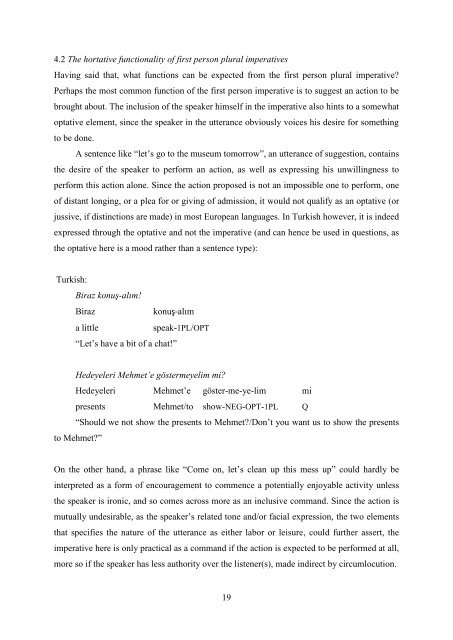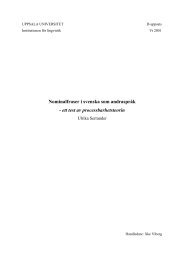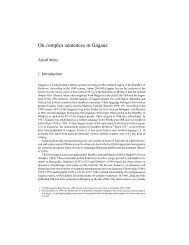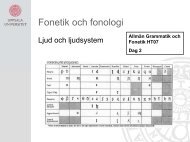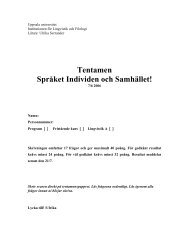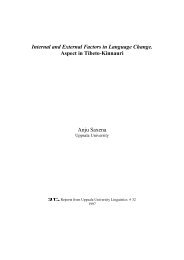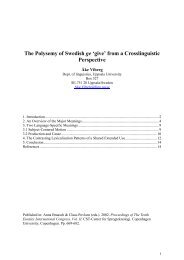The function of non-canonical imperatives in the languages of Europe
The function of non-canonical imperatives in the languages of Europe
The function of non-canonical imperatives in the languages of Europe
Create successful ePaper yourself
Turn your PDF publications into a flip-book with our unique Google optimized e-Paper software.
4.2 <strong>The</strong> hortative <strong>function</strong>ality <strong>of</strong> first person plural <strong>imperatives</strong><br />
Hav<strong>in</strong>g said that, what <strong>function</strong>s can be expected from <strong>the</strong> first person plural imperative<br />
Perhaps <strong>the</strong> most common <strong>function</strong> <strong>of</strong> <strong>the</strong> first person imperative is to suggest an action to be<br />
brought about. <strong>The</strong> <strong>in</strong>clusion <strong>of</strong> <strong>the</strong> speaker himself <strong>in</strong> <strong>the</strong> imperative also h<strong>in</strong>ts to a somewhat<br />
optative element, s<strong>in</strong>ce <strong>the</strong> speaker <strong>in</strong> <strong>the</strong> utterance obviously voices his desire for someth<strong>in</strong>g<br />
to be done.<br />
A sentence like “let’s go to <strong>the</strong> museum tomorrow”, an utterance <strong>of</strong> suggestion, conta<strong>in</strong>s<br />
<strong>the</strong> desire <strong>of</strong> <strong>the</strong> speaker to perform an action, as well as express<strong>in</strong>g his unwill<strong>in</strong>gness to<br />
perform this action alone. S<strong>in</strong>ce <strong>the</strong> action proposed is not an impossible one to perform, one<br />
<strong>of</strong> distant long<strong>in</strong>g, or a plea for or giv<strong>in</strong>g <strong>of</strong> admission, it would not qualify as an optative (or<br />
jussive, if dist<strong>in</strong>ctions are made) <strong>in</strong> most <strong>Europe</strong>an <strong>languages</strong>. In Turkish however, it is <strong>in</strong>deed<br />
expressed through <strong>the</strong> optative and not <strong>the</strong> imperative (and can hence be used <strong>in</strong> questions, as<br />
<strong>the</strong> optative here is a mood ra<strong>the</strong>r than a sentence type):<br />
Turkish:<br />
Biraz konuş-alım!<br />
Biraz<br />
konuş-alım<br />
a little<br />
speak-1PL/OPT<br />
“Let’s have a bit <strong>of</strong> a chat!”<br />
Hedeyeleri Mehmet’e göstermeyelim mi<br />
Hedeyeleri Mehmet’e göster-me-ye-lim mi<br />
presents Mehmet/to show-NEG-OPT-1PL Q<br />
“Should we not show <strong>the</strong> presents to Mehmet/Don’t you want us to show <strong>the</strong> presents<br />
to Mehmet”<br />
On <strong>the</strong> o<strong>the</strong>r hand, a phrase like “Come on, let’s clean up this mess up” could hardly be<br />
<strong>in</strong>terpreted as a form <strong>of</strong> encouragement to commence a potentially enjoyable activity unless<br />
<strong>the</strong> speaker is ironic, and so comes across more as an <strong>in</strong>clusive command. S<strong>in</strong>ce <strong>the</strong> action is<br />
mutually undesirable, as <strong>the</strong> speaker’s related tone and/or facial expression, <strong>the</strong> two elements<br />
that specifies <strong>the</strong> nature <strong>of</strong> <strong>the</strong> utterance as ei<strong>the</strong>r labor or leisure, could fur<strong>the</strong>r assert, <strong>the</strong><br />
imperative here is only practical as a command if <strong>the</strong> action is expected to be performed at all,<br />
more so if <strong>the</strong> speaker has less authority over <strong>the</strong> listener(s), made <strong>in</strong>direct by circumlocution.<br />
19


